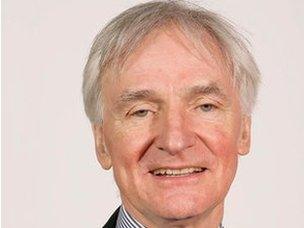The difference between ‘research’ and ‘statistics’
- Published
- comments

Sir Michael Scholar
When employment minister Chris Grayling and immigration minister Damian Green gave the Daily Telegraph an exclusive last week on foreign nationals who claim benefits they brought together two of the most combustible ingredients in popular political debate: illegal immigrants and benefit cheats.
Their article revealed how, external a new and "complex research exercise" had identified some 371,000 foreign-born residents who receive some kind of welfare payment. The ministers wrote of how they'd "already identified some with serious question marks over both their right to benefits and their immigration status."
It later became clear that the figures did not reveal any significant abuse of the welfare system: the vast majority of those claiming benefits were perfectly entitled to them. What was more, it turned out that migrants were less likely than Britons to claim out-of-work benefits.
Today, the head of the official watchdog on government statistics, Sir Michael Scholar of the UKSA, has written, external to the Mr Grayling's boss, Iain Duncan Smith at the Department of Work and Pensions questioning the interpretation and release of the new "research".
"We note that DWP issued these as a research report, not as official statistics," Sir Michael writes, adding that the department's website refers to the research as "publication of ad-hoc statistics".
"Many users have treated them as official statistics, and have assumed that they should have been published in accordance with the Code of Practice," he continues.
This is important because what the code does is prevent government ministers from "issuing a political commentary on the statistics ahead of their publication", for example, in a controversial article in the Daily Telegraph.
Sir Michael points out that the DWP's own report on the research recognises that the numbers were highly vulnerable to misinterpretation. "There are some important caveats and weaknesses that need to be explained carefully and objectively to Parliament and the news media at the time of publication," Sir Michael adds in his letter.
The profound concerns of the UK Statistics Authority at this kind of ministerial behaviour are reflected in a lecture Sir Michael gave at Cambridge University last year. "There are strong forces at work," he told his audience at St John's College, "whose natural outcome is, I suggest, to demote rationality, analysis and the pursuit of knowledge within government."
Referring to "a new kind of departmental minister whose consuming interest is in what the next day's press will say", Sir Michael referred to Whitehall's "diminishing interest in analysis and enquiry, and, in the field of government information, a growing interest in the persuasive press release, with its careful selection of facts and numbers, designed to communicate as effectively as possible some predetermined message."
I think it reasonable to assume that in seeking independent statistical oversight of the numbers splashed over last week's Telegraph front page, Sir Michael is doing what he can to counter just that trend.